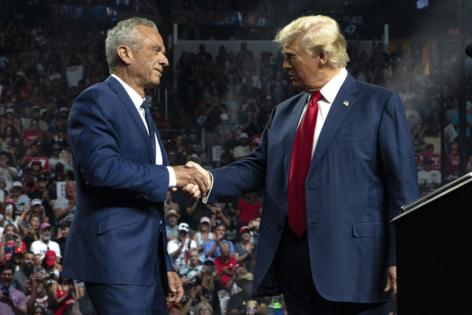Trump victory highlights distrust in public health institutions
Published in Health & Fitness
WASHINGTON -- In his victory speech Tuesday night, President-elect Donald Trump foreshadowed his health care agenda by giving a shoutout to a key supporter who has suggested pulling approved vaccines from the market, removing fluoride from the water supply and vastly overhauling the federal health agencies.
“We can add a few names, like Robert F. Kennedy Jr.,” Trump told supporters. “And he’s going to help make America healthy again. He’s a great guy and really means that he wants to do some things, and we’re going to let him do it.”
Kennedy, 70, a political independent who dropped out of the presidential race in August to back Trump, applauded Trump’s victory in a tweet Wednesday morning.
But Trump’s victory — and the newly forged alliance between the two men — have caused medical and public health experts to express alarm. They worry that Kennedy’s proposals are not based in fact and would be harmful to Americans’ health.
Trump pledged on the campaign trail to give Kennedy free rein over the administration’s health care road map, including women’s health.
But it remains to be seen how exactly his plans will come to fruition.
Analysts and public health experts have said Kennedy’s assessment of the United States’ web of health care institutions is indicative of a rising trend of distrust in institutions that will be a paramount issue to the incoming Trump administration.
In a March 2023 study published in Health Affairs, roughly a quarter of Americans said they trusted the Centers for Disease Control and Prevention’s health recommendations “not very much” or “not at all.”
Ezekiel Emanuel, an oncologist and professor of medicine at the University of Pennsylvania, said in an interview that Kennedy’s distrust of agencies is reflective of the rise of populism this election cycle.
“Every time populism rises, one of the things that rises with it is a suspicion and hostility to experts, the idea that someone knows better,” he said.
Emanuel said a variety of factors play into that suspicion: “They have to do with many people feeling like life is out of their control, like things are done to them, rather than with their consent, which I think are quite legitimate, but I don’t think it’s, by and large, by experts.”
Emanuel emphasized that some of Kennedy’s talking points have nuggets of truth to them, pointing to his concerns about conflicts of interest among agency officials. He also said Kennedy’s concerns with high levels of obesity and processed food in the country are based in fact.
Between 2021 and 2023 the United States had an obesity prevalence of 40 percent among adults, according to CDC data. Obesity increases the risk of chronic diseases like hypertension, type 2 diabetes and some cancers.
The lingering distrust traces back to the federal response to the COVID-19 pandemic, when Americans were skeptical about rapidly changing information flowing from the government.
Emanuel said there were issues with how the government initially responded, including evolving guidance from the CDC around masking and school closures. He said the public health community should be more “humble” about its emergency response next time around.
“We haven’t had a full period of real, important self-reflection on this,” he said.
‘Learning on the job’
Another factor that has public health figures on edge about the potential for Kennedy to drive health care is his lack of experience in the field.
Kennedy does not hold a medical degree and has never worked in the health care field, but Trump has hinted that he will play a key role in selecting administration positions like surgeon general and secretary of Health and Human Services.
“The problem is that if you put in people who are not skilled at that, it’s a big learning curve and people get hurt along the way,” Georges Benjamin, executive director of the American Public Health Association, said in an interview.
Benjamin said that even in an advisory role, Kennedy could have vast influence over the president’s health care agenda.
“We’re not opposed to working with anyone that wants to do things that are good science and evidence-based and will improve health,” he said. “It’s just, we think you ought to be led by people who aren’t learning on the job.”
One way to boost public trust could be to lean on primary care providers, which are generally more trusted by the public than federal agencies.
According to an August survey conducted by the communications firm Edelman, 83 percent of respondents said they trusted their primary care provider to tell the truth about public health issues.
“As Americans’ trust in public health broadly, in the health care system broadly, has plunged, their trust of their individual clinicians, their doctors, their nurses, their longtime primary care providers remains strong,” Sejal Hathi, the director of the Oregon Public Health Authority and former White House senior policy adviser during the Biden administration, said in an interview.
©2024 CQ-Roll Call, Inc., All Rights Reserved. Visit cqrollcall.com. Distributed by Tribune Content Agency, LLC.










Comments